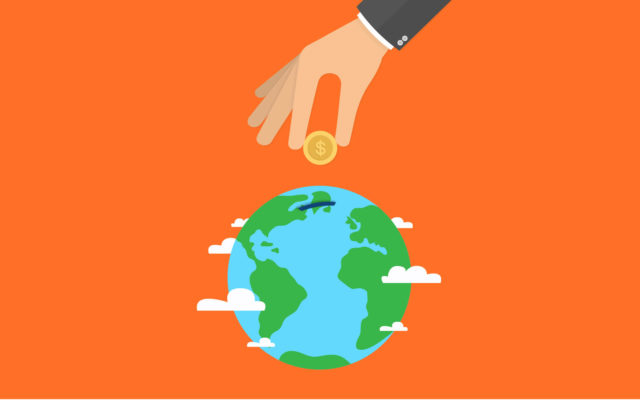Over the last few years there has been a noticeable shift in public perception when it comes to what constitutes good business. In 2019 consumers have a conscience and they want to know that the companies they buy from do too: enter, the social enterprise.
Social enterprise as a concept is nothing new, the term was first coined in the 1970s. But the overwhelming success of a few key players (TOMs anyone?) coupled with an increasing awareness of global inequality and climate crisis in recent years has led to an inundation of new companies committed to doing good.
On the face of it, this seems like a great thing: people are always going to continue shop with, and invest money in, for-profit companies so why not address some global issues at the same time? Surely that can only be a good thing?
And it is. Mostly.
There are some genuinely great companies out there working their hardest to ensure their employees receive fair wages, limiting their carbon footprint as much as they can and simply doing their bit to make business more ethical.
Many of these companies have noble goals: just look at Hey Girls, the buy one give one femcare company who tackle the issue of period poverty in the UK, SocialBite who have gone from success to success in their mission to end homelessness and Tony’s Chocolonely, which was set up when founder, Teun van de Keuken, was horrified to learn about the extent of slavery in the chocolate industry and began working to create an 100% slavery free option.


It is hard to argue against supporting a business who’s core values are so undeniably important – yet critics of this kind of ethical consumerism claim that, in fact, there can be nothing ethical about capitalist consumerism and that it is not the most effective way to tackle world issues.
Journalist Maya Singer, writing for Vogue, makes a distinction between our actions as consumers and our actions as citizens. She believes it is a ‘mistake to tell people that the primary power they have to make change is by voting with their pocket books’ and that instead we should be demanding change in public policy.
She suggests that people are tired with having to face a moral dilemma every time they make a purchase and I couldn’t agree more.
It shouldn’t be the consumer’s responsibility to research and select the most ethical shampoo or chocolate bar, but the producer’s duty to ensure that their products and practices are not harmful.
The fact is, it is the global companies and large scale manufacturers who have the potential to make the greatest impact. A recent study has shown there are just 20 firms responsible for a third of all carbon emissions globally. Imagine the difference these 20 firms could make by taking a more socially minded stance on CO2 emissions.

No matter how many people start making little changes like cutting out meat, seeking out more ethical suppliers, buying a bamboo toothbrush – until companies like these 20 firms stop passing off responsibility to their customers and start taking account of their own actions there will be no change.
I’m talking about actually holding themselves to account, not just investing in an elaborate and totally greenwashed PR campaign (I’m looking at you H&M – introducing a ‘Conscious Collection’ does not take away from the harm done by all your other “unconscious” collections).
Thankfully, both consumers and producers are (slowly) waking up to this reality and organisations such as B-Corporation have appeared on the scene to cut through the crap.

Certified B-Corps (which stands for Benefit Corporations) are ‘businesses that meet the highest standards of verified social and environmental performance, public transparency, and legal accountability to balance profit and purpose’. To become a B-Corp, companies must score highly on the rigorous B Impact Assessment, meet the legal requirement to consider the impact of their decisions on all their stakeholders and submit the necessary documentation to back up the result of their assessment and be validated by the organisation. This will be reassessed every 3 years. They will then have to sign a ‘Declaration of Interdependence’ in which they must promise to ‘be the change we seek in the world’ and acknowledge dependence upon each other, and therefore responsibility for each other.
The idea behind B-Corps and other accreditation organisations such as the Social Enterprise Mark is to encourage transparency and put the responsibility for ethical consumption back onto the shoulders of the producers. A customer no longer has to stress about the wider impact of their purchasing decision – if a product carries the B-Corp stamp, it has met a high standard of social responsibility which takes the companies entire social and environmental impact into consideration, from supply chain to shop floor.
Although the organisation originated in the States it has now become a global movement with some big names signed up. Last year Danone became the world’s largest B-Corp and more recently they have publicly committed to the goal of getting their entire global operations certified.
Personally, I think that social enterprises are great, but they shouldn’t have to exist. There shouldn’t be a specific need for a model of business that doesn’t cause harm because no business should be inherently harmful.
In her article, Singer gets to the very root of the problem when she highlights issues with regulation of supply chains and the public’s lack of trust in the industry to self-regulate. Organisations like B-Corp are simply stepping in to fill a gap in public policy and creating a template of regulation around what it means to be a socially responsible business. The high standards to which Certified B-Corporations hold themselves should be the norm, not the exception.
But until such a day as stricter regulation is enforced globally, we’ll have to keep voting with pounds and petitions for the guys who are doing it right.
